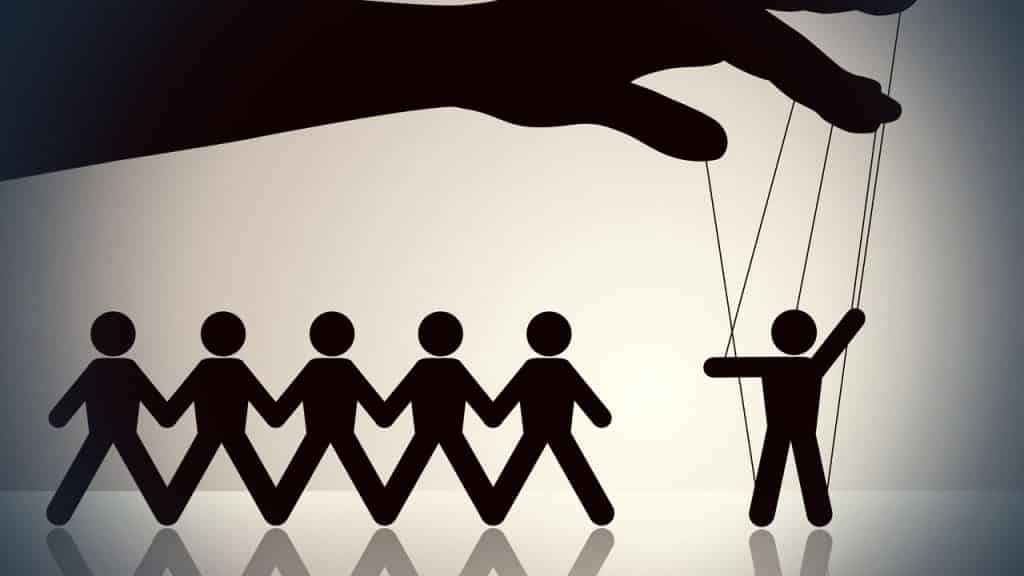A little background: a few weeks ago, I wrote “Marketing to the ‘Why’”, after which ensued an interesting conversation between myself and Arth Strout of Customer First Marketing (you can read the conversation in the comments of the post). During the back and forth, Arth said that he has no intention of being “that” kind of marketer – that is, the manipulating kind. He thinks that considering the customer first and the sales later isn’t traditional thinking.
I’ve spent the past several days thinking about this, because it’s an important point to look at. Is marketing just another word for manipulation? Is the “customer first” attitude really non-traditional?
After much thought I have to say that I think it’s quite the opposite. Although the sales approach may have become the norm, it’s a far cry from back in the day, when a handshake and someone’s word was good enough to go by.
I’ll even go one step further. If you think that you are manipulating your clientele to buy your service or product, then you have no faith in the value of your product or service. And if you have no faith, how can they?
What is Manipulation, Really?
Firstly, when was the last time you looked up what “manipulation” meant? Did you know there were two different meanings? Did you know that only one of them is negative?
The first meaning is to handle or control, typically in a skillful manner. Therefore, one can manipulate a robotic arm or remote control car.
The second meaning is to control or influence cleverly, unfairly or unscrupulously. This is the meaning most often applied to marketing. As Arth says, it’s the implied word behind marketing. As if, simply by being a marketer or by participating in the act of marketing, you are unscrupulous
Are You Marketing True Value or Falsely Manipulating Your Customers?
For those of you who feel like all marketing is manipulation – and therefore choose to wallow in guilt as you halfway sell your product -, I’d like you to take a moment to consider what you’re selling. Is it shoes? Glasses? Clothing? Cleaning supplies? Maybe you run a marketing agency, like Arth does. Or a writing service. Or a cleaning service… or…
The point is, if the customer didn’t buy from you, would they be buying from someone else? In other words, do they actually need your product, or find it useful in some way? If so, then the problem isn’t the product itself; the problem is that you don’t feel your product is particularly valuable.
So the real question is, what is it about your product or service that isn’t worthwhile?
Selling the True Value, Not the Product
It may seem like I’m splitting hairs, but these are important distinctions. Manipulation (the negative kind) assumes that you are knowingly selling a worthless product to a customer using false promises or other falsehoods. In other words, you are actively lying to sell a piece of crap.
Is that what you’re doing? If so, then yes, you are a manipulative jerk, shame on you, go hang your head.
If not, then maybe you need to get a fresh perspective on your product or services. You need to find out what the true value is for the customer. What do they get out of it?
And while I’m on this topic, I have to rant for a second. I was recently looking at WordPress themes and came across the word “unique” so many times I lost count. For example, “…allows you to put a sidebar on either the left or the right for a truly unique look.”
You know, words mean things. “Unique” means that there is no other kind like it. One of a kind. Extremely rare. To the power of One. Unduplicated. If you’re selling a WordPress theme, talking about sidebars, and using the word “unique”, this is an example of manipulation. Bad manipulation at that.
You are not a unique snowflake. Rant over.
The above is not focusing on the true value. The value is that you can move the sidebar. The value (in this case) is not about being unique.
Getting Rid of Over-used, Manipulative Verbiage
George Carlin used to crack me up. “How can something be both ‘new’ and ‘improved’”? They can’t, and yet you see this kind of sales talk every time you turn on late night T.V.
I hate to break it to you, but most products are not innovative. They aren’t revolutionary, pioneering, state-of-the-art or cutting-edge. -And if they really are fantastic or stunning, let the customers tell others.
Getting Rid of Useless Verbiage
Useless verbiage can sneak into your sales copy without realizing it – especially if you don’t really know why your product has value. You say things like “really good” or “very useful”. An example: do your customers leverage or utilize your product? Maybe they should just use it, instead.
Useless verbiage is often put into the sales material as a way to pump up the product – kind of like verbal steroids. Instead of saying that something is very useful, explain what makes it very useful.
Above All, Do Remember the Customer
The customer should come first. Why? Because they keep your company going.
In fact, this is why marketing can’t actually be manipulation/tricking algorithms you know. If you spend your days lying to customers about your product or service, you’re shortly going to run out of customers. Not to mention that word gets around, and you will find yourself with a horrible reputation for crappy products.
So, by all means, put the customer first. Tell the truth about your products or services. However, tell the whole truth. You have a good product. It is what the customer needs; the marketing just lets them know they can get it from you.
Do you need help with transparent marketing? Give us a call – we’ll help you through it.




































One Response
Good Day to You Gabriella,
I’m honored that you have taken our conversation on “Marketing to the Why” to this meaningful follow-up post. I appreciate the mention, as any blogger would, but even more, your continued help with this “tug of war” between good marketing and “Manipulation”.
I’m sure this is something that many of us struggle with.
Wanting to feel comfortable selling products we believe in, while not feeling like we have to play some kind of “manipulation game” to do so.
I’m glad you mentioned when “a handshake and someone’s word was good enough to go by”.
This is exactly the principle my dad always believed in. He wasn’t talking about “sales”, just our day by day behavior.
The “Power of Persuasion” is a difficult read. The end of nearly every explanation talks about how each of the marketing technics mentioned has a “negative side” to it.
We are always cautioned about it, with examples, in an attempt to discourage misuse.
One small correction:
I’m not running a “marketing agency”, just trying to make my own way in this very confusing and often overly competitive “thing called marketing”.
At this point, it really doesn’t matter what products or niche I have personally settled on, because the bigger picture of providing “True Value” instead of sacrificing quality just trying to “manipulate a sale”, is more important for everyone to consider.
Struggling with this has helped me work out some of my own “demons”.
I’ve stopped spinning my own wheels, spending so much time overthinking this and have settled on a niche that is based on something I’ve love my entire life and feel confident doing.
Why? I honestly feel good about it because of the confidence that comes from believing that what I offer is really helpful for my customer. Not only to my customer, but my larger audience as well.
After all, we shouldn’t consider every visitor or social media as a “potential customer”. Oh my! Am I speaking out of turn here? I don’t believe that attitude is even healthy, let alone works.
I’m a big fan of George Carlin as well. He used an analogy about all the talk about “climate change”. It goes something like “The earth was here long before us, when we are done messing it up, the earth will just start over. Like we were never here. It won’t miss us at all.”
The way he said it was just hilarious, but spoke the truth.
It’s the same with marketing:
If we don’t respect our customer’s intelligence and provide the customer experience they deserve and expect, we will be gone, because they won’t be loyal.
We will have lost their trust.
I’ve always used the phrase “what you see is what you get”, as a big part of describing who I am. This was also passed down to me from my dad. It speaks to honesty, respecting others and being reliable.
Being “just me” is another way to say this.
What really sells me?
It isn’t the “useless verbiage” pretty pictures, pop-ups getting in the way, the smooth podcast, or even well done video.
Knowing the product works and that if I have a problem, someone honest and respectful will be there to help.
Nothing else.
Bringing all this clearly to the surface is much appreciated Gabriella.
This speaks volumes about you as a person and the team here at Level 343.
Loyalty follows value.
You’ve proven your value with this post.
I hope our conversation helps to instill on other marketers reading, the true value of the principles being talked about here.
Let’s all bring Value and putting the value of our customers first.
Everyone will be better for it.
My Best to You
Arth